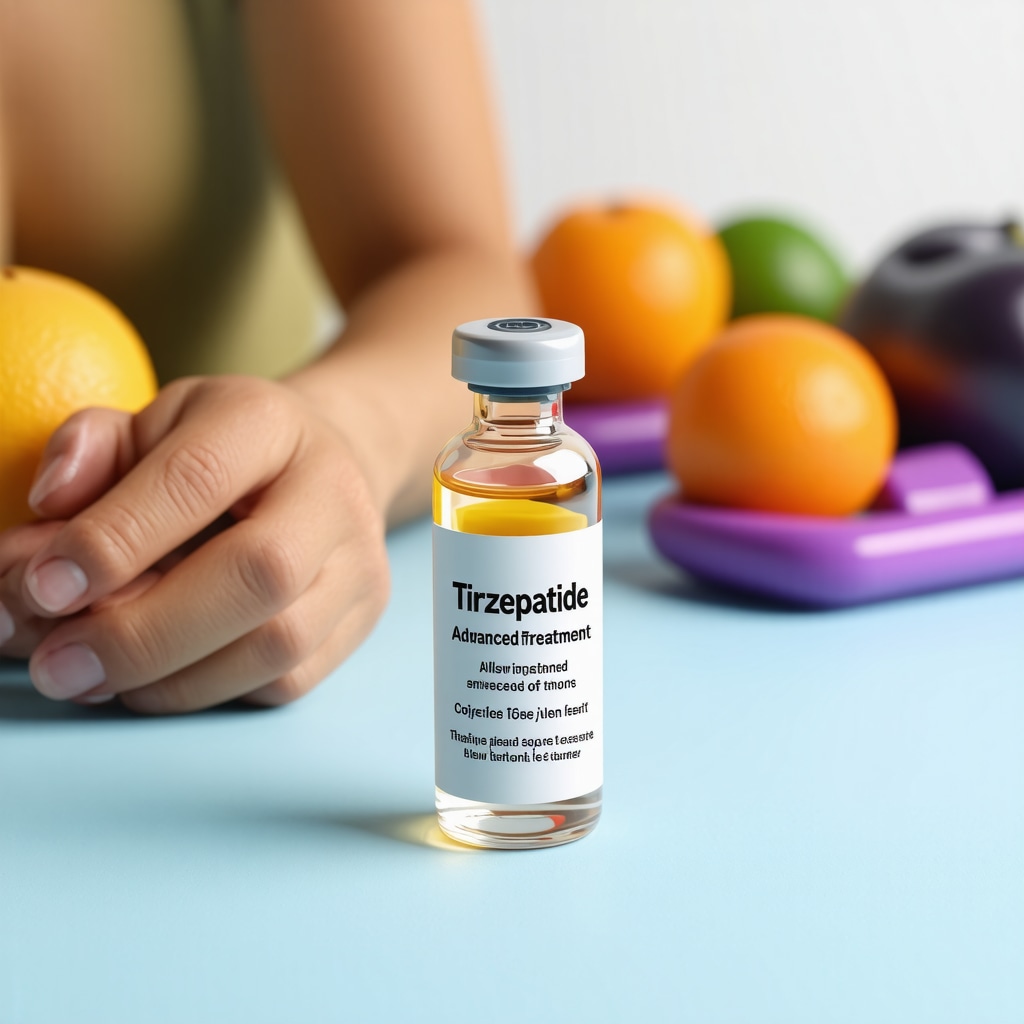Unlocking New Frontiers in Obesity Medicine with Tirzepatide in New Jersey
In the evolving landscape of obesity treatment, New Jersey stands at the forefront with cutting-edge advancements that promise transformative outcomes for patients struggling with weight management. Among the latest breakthroughs is tirzepatide therapy, an innovative dual-action medication that harnesses the synergistic effects on metabolic regulation. This novel approach is reshaping obesity medicine by offering unprecedented efficacy in fat loss, appetite control, and glycemic management, tailored specifically for New Jersey’s diverse patient population.
The Science Behind Tirzepatide: A Dual Hormonal Approach to Fat Loss
Tirzepatide uniquely combines the actions of GLP-1 and GIP receptor agonism, enhancing insulin secretion and promoting satiety while reducing caloric intake. This dual incretin effect translates into significant weight reduction and improved metabolic health, surpassing traditional monotherapies. Clinical trials have demonstrated that tirzepatide can lead to weight loss exceeding 20% of body weight in some patients, a milestone that positions it as a paradigm-shifting agent in obesity medicine (NEJM, 2023). The capacity to simultaneously target multiple pathways offers a robust strategy against obesity’s multifactorial nature.
Tailoring Tirzepatide Therapy: Personalized Obesity Medicine in NJ Clinics
One of the hallmarks of effective obesity medicine is the customization of treatment plans. In New Jersey, expert clinicians integrate tirzepatide therapy with comprehensive lifestyle interventions, including nutrition optimization and exercise regimens, to enhance and sustain weight loss. These physician-supervised programs ensure safety and maximize therapeutic benefits by adjusting dosages and monitoring metabolic responses, addressing individual variability in treatment outcomes. This precision medicine approach reflects a deep understanding of obesity as a chronic disease requiring nuanced interventions.
How Does Tirzepatide Compare to Other Weight Loss Medications in NJ?
Compared to established agents like semaglutide, tirzepatide’s dual incretin mechanism offers superior weight loss results and better glycemic control, making it especially beneficial for patients with obesity complicated by type 2 diabetes. However, the therapy’s success depends on medical supervision to manage potential side effects such as gastrointestinal discomfort. NJ clinics emphasize patient education, adherence, and regular follow-up to ensure optimal outcomes. This careful balance of efficacy and safety demonstrates why tirzepatide is becoming the preferred option in New Jersey’s obesity medicine landscape.
Real-World Impact: Patient Experiences with Tirzepatide in New Jersey
Consider the case of a 45-year-old NJ resident with obesity and prediabetes who embarked on a tirzepatide regimen under medical supervision. Over six months, this patient experienced a 25% weight reduction accompanied by improved blood sugar levels and enhanced energy. This real-world example underscores tirzepatide’s potential to not only reduce weight but also mitigate obesity-related comorbidities. Such transformative results inspire hope and demonstrate the tangible benefits of integrating advanced pharmacotherapy with personalized care.
For those interested in exploring tirzepatide therapy, New Jersey offers expert consultations and supervised treatment programs designed to maximize safety and effectiveness. Learn more about medical weight loss with tirzepatide care and discover customized plans that align with your health goals.
If you found these insights valuable, share this article with others seeking innovative obesity treatments or comment below with your questions about tirzepatide therapy.
Adapting to the Lifestyle Changes Alongside Tirzepatide
When I first started using tirzepatide as part of my weight loss journey, I quickly realized that medication alone wasn’t the magic bullet. It was the combination of the drug with small but meaningful lifestyle tweaks that truly made a difference. For example, I began paying closer attention to my meal timing and portion sizes, which helped me avoid the common pitfalls of overeating despite reduced appetite. My energy levels improved, which motivated me to take more daily walks and incorporate light exercise routines. These changes, although incremental, compounded over weeks and months to sustain the weight loss.
New Jersey clinics specializing in safe weight loss injections with tirzepatide often emphasize this holistic approach. Medical professionals guide patients not just on medication but on nutrition, physical activity, and mental health support, recognizing that obesity is multifaceted.
What Are the Most Common Challenges Patients Face When Starting Tirzepatide?
One common question I encounter is about the hurdles people face when initiating tirzepatide therapy. Many report initial gastrointestinal side effects like nausea or mild discomfort, which usually subside as the body adjusts. Some struggle with maintaining consistency in weekly injections or integrating new dietary habits. What helped me was establishing a routine with my healthcare provider’s support—setting reminders for injections, keeping a food journal, and attending regular follow-ups. This not only improved adherence but also empowered me to communicate openly about my progress and any concerns.
According to the American Diabetes Association, patient education and support are critical factors in maximizing the benefits of therapies like tirzepatide (Diabetes Care, 2023), reinforcing the importance of a comprehensive care model.
Finding the Right Support: Choosing a Tirzepatide Weight Loss Doctor in NJ
From my experience, the choice of the healthcare provider can greatly influence the success of tirzepatide therapy. New Jersey offers access to specialized doctors who understand the nuances of obesity medicine and tailor treatment plans accordingly. When searching for a provider, I looked for those who not only prescribe the medication but also provide ongoing monitoring and lifestyle counseling. This approach helped me feel supported throughout my journey.
If you’re considering this therapy, I recommend exploring resources like how to find a tirzepatide weight loss doctor near you in NJ to connect with trusted clinics offering personalized care. Building a relationship with your doctor can make all the difference in navigating challenges and celebrating milestones.
Have you tried tirzepatide or considered it for weight loss? Share your experiences or questions in the comments below—I’d love to hear your story and help build a supportive community.
Elevating Tirzepatide Therapy: Integrating Behavioral Science for Sustainable Weight Management
Achieving lasting success with tirzepatide extends beyond pharmacology; it requires a sophisticated behavioral framework tailored to individual patient psychology and lifestyle patterns. New Jersey obesity specialists are pioneering integration of cognitive-behavioral therapy (CBT) and motivational interviewing alongside tirzepatide regimens. These evidence-based psychological interventions enhance patients’ self-efficacy, helping them navigate weight-related habits and emotional triggers that often undermine treatment adherence.
For instance, a patient struggling with emotional eating might benefit from real-time coping strategies developed through CBT, which complement the appetite suppression effects of tirzepatide. This dual approach not only accelerates weight loss but also fortifies mental resilience, reducing relapse risk. Such holistic protocols represent the cutting edge in obesity medicine, marrying drug efficacy with personalized behavioral health.
How do psychological support interventions optimize tirzepatide treatment outcomes in complex obesity cases?
Research published in Obesity Reviews (2021) highlights that adding structured psychological support to pharmacotherapy improves long-term weight maintenance and patient satisfaction. In New Jersey clinics, multidisciplinary teams including psychologists work closely with endocrinologists and dietitians, crafting integrative care pathways that address both physiological and psychological determinants of obesity.
Moreover, leveraging digital health tools like mobile apps for self-monitoring and telehealth consultations enhances patient engagement and allows timely interventions. This dynamic, data-driven approach fosters a feedback loop empowering patients and clinicians to make informed adjustments, optimizing therapeutic benefit.
Precision Titration Protocols: Mitigating Side Effects While Maximizing Tirzepatide Benefits
Gastrointestinal side effects remain the most common barrier to tirzepatide adherence. However, New Jersey obesity experts have refined precision titration protocols that carefully calibrate dose escalation schedules based on individual tolerance and metabolic responses. These protocols often begin with ultra-low doses, gradually increasing over weeks to minimize nausea, vomiting, or diarrhea.
Additionally, co-administration of dietary counseling focused on low-fat, small frequent meals reduces gastrointestinal load. Patients are educated to recognize early signs of intolerance and empowered to communicate promptly with their care teams, enabling dose adjustments or symptomatic treatments. This meticulous balancing act between efficacy and tolerability exemplifies expert-level care that transforms initial challenges into manageable phases of therapy.
Exploring the Synergistic Potential of Tirzepatide and Adjunctive Therapies in NJ
Emerging research in New Jersey is investigating the combination of tirzepatide with complementary interventions such as structured exercise programs, gut microbiome modulation, and even emerging metabolic devices to potentiate weight loss and metabolic health. For example, pilot studies integrating tirzepatide with high-intensity interval training (HIIT) have demonstrated enhanced insulin sensitivity and further fat mass reduction beyond monotherapy.
Similarly, dietary supplementation aimed at restoring gut microbial diversity may amplify incretin hormone effects, though this frontier remains under active investigation. As these innovative adjuncts mature, NJ clinics are uniquely positioned to translate them into personalized multimodal regimens that address obesity’s complex pathophysiology from multiple angles.
Are you curious about how these advanced strategies can enhance your tirzepatide journey? Connect with New Jersey’s top obesity specialists to explore tailored programs that integrate medication, psychology, and lifestyle for transformative results.

Harnessing Behavioral Science for Enhanced Tirzepatide Outcomes
Beyond the pharmacodynamic advantages of tirzepatide, New Jersey’s obesity medicine experts emphasize the critical role of behavioral science in sustaining long-term weight management. Integrative approaches employing cognitive-behavioral therapy (CBT), motivational interviewing, and personalized psychological support are meticulously tailored to dismantle entrenched maladaptive eating behaviors and emotional triggers. This multidimensional framework synergizes with tirzepatide’s appetite modulation to foster durable lifestyle transformations and reduce the risk of relapse.
Patients benefit from structured psychological interventions that empower self-regulation, fortify adherence, and cultivate resilience against environmental and emotional challenges. Moreover, the integration of digital health tools, including telehealth and mobile self-monitoring applications, facilitates continuous engagement and real-time adjustments, epitomizing a precision behavioral medicine paradigm.
How do psychological support interventions optimize tirzepatide treatment outcomes in complex obesity cases?
According to a comprehensive review published in Obesity Reviews (2021), multidisciplinary care models that embed psychological therapies within pharmacological regimens significantly enhance weight loss durability and patient satisfaction. In New Jersey, such integrated care pathways have demonstrated superior clinical outcomes by addressing both the neurobehavioral and metabolic dimensions of obesity, particularly in patients with comorbid psychological conditions.
Precision Titration Protocols: Balancing Efficacy and Tolerability
Gastrointestinal adverse effects, including nausea and diarrhea, remain notable barriers to tirzepatide adherence. Pioneering clinicians in New Jersey have developed precision titration protocols that initiate treatment at ultra-low doses with gradual escalation tailored to individual tolerance and metabolic feedback. This methodical approach mitigates side effects, enhances patient comfort, and optimizes therapeutic windows.
Complementary dietary strategies focusing on low-fat, small, and frequent meals further attenuate gastrointestinal burden. Patient education emphasizes early recognition of side effect onset, facilitating prompt provider communication and dynamic dose adjustments. Such meticulous dose modulation exemplifies expert-level management that converts initial challenges into manageable phases, safeguarding persistence and maximizing clinical benefit.
Synergistic Modalities Amplifying Tirzepatide’s Impact in New Jersey
Cutting-edge research within New Jersey is exploring adjunctive therapies that potentiate tirzepatide’s metabolic effects through complementary mechanisms. Structured high-intensity interval training (HIIT) regimens have been integrated with tirzepatide therapy, yielding augmented improvements in insulin sensitivity and adiposity reduction beyond monotherapy capabilities.
Additionally, modulation of the gut microbiome through targeted nutritional supplementation is an emerging frontier. While still investigational, preliminary data suggest that restoring microbial diversity may enhance incretin hormone responsiveness, providing a novel axis to amplify tirzepatide’s efficacy.
As these innovative strategies evolve, New Jersey clinics are uniquely positioned to deploy personalized multimodal interventions that holistically address the multifactorial pathophysiology of obesity.
Are you intrigued by these advanced integrative approaches to optimize your tirzepatide journey? Connect with New Jersey’s leading obesity medicine specialists to design a customized plan that fuses pharmacotherapy, behavioral science, and lifestyle innovation for transformative weight management.

Frequently Asked Questions (FAQ)
What makes tirzepatide different from other weight loss medications?
Tirzepatide is unique due to its dual agonist action on GLP-1 and GIP receptors, enhancing insulin secretion and appetite suppression more effectively than single-agent therapies like semaglutide. This dual incretin effect results in greater weight loss and improved glycemic control, particularly beneficial for patients with obesity and type 2 diabetes.
How is tirzepatide therapy personalized for patients in New Jersey?
Clinicians in New Jersey tailor tirzepatide dosing and adjunct lifestyle interventions based on patient-specific metabolic responses, tolerance, and comorbidities. Precision titration protocols and integrated behavioral support optimize safety and efficacy, ensuring treatment aligns with individual health profiles.
What are the common side effects of tirzepatide, and how are they managed?
Gastrointestinal symptoms such as nausea, vomiting, and diarrhea are the most frequent side effects. New Jersey specialists mitigate these through slow dose escalation, dietary counseling emphasizing low-fat small meals, and close patient monitoring to adjust doses promptly, enhancing adherence.
Can tirzepatide be combined with other therapies for better results?
Yes, emerging New Jersey research supports combining tirzepatide with adjunctive approaches like high-intensity interval training (HIIT), behavioral therapies including cognitive-behavioral therapy (CBT), and potentially gut microbiome modulation to achieve synergistic improvements in weight and metabolic health.
How important is psychological support during tirzepatide treatment?
Psychological interventions significantly enhance treatment outcomes by addressing emotional eating, motivation, and adherence barriers. Multidisciplinary care models in New Jersey integrate behavioral science with pharmacotherapy to sustain long-term weight loss and improve patient satisfaction.
Is tirzepatide suitable for everyone struggling with obesity?
Tirzepatide is primarily indicated for adults with obesity or overweight with related comorbidities, such as type 2 diabetes. However, candidacy depends on comprehensive evaluation by specialists to ensure safety, appropriateness, and individualized care plans.
How do New Jersey clinics support patients initiating tirzepatide therapy?
Clinics provide education on medication administration, side effect management, lifestyle modifications, and continuous monitoring. They emphasize establishing routines, regular follow-ups, and multidisciplinary support to enhance adherence and therapeutic success.
What is the expected timeline for weight loss results with tirzepatide?
Patients commonly observe gradual weight loss over several months, with some clinical trials reporting up to 20%-25% body weight reduction within 6 months. Individual results vary based on adherence, dose titration, and lifestyle factors.
How does tirzepatide affect blood sugar control in patients with diabetes?
Tirzepatide improves glycemic control by enhancing insulin secretion and reducing glucagon release, complementing its weight loss effects. This dual benefit makes it especially effective for patients with obesity complicated by type 2 diabetes.
Where can I find specialized tirzepatide treatment in New Jersey?
New Jersey offers access to expert obesity medicine clinics with providers trained in tirzepatide therapy. Resources like finding a tirzepatide weight loss doctor near you can guide patients toward personalized care options.
Trusted External Sources
- New England Journal of Medicine (NEJM): Provides seminal clinical trial data on tirzepatide’s efficacy and safety, establishing its role in obesity and diabetes management.
- American Diabetes Association (ADA): Offers updated guidelines and expert consensus on incretin-based therapies, including tirzepatide, highlighting best practices for patient education and care integration.
- Obesity Reviews (PMC Article): A comprehensive review presenting evidence on behavioral interventions combined with pharmacotherapy, underscoring multidisciplinary treatment benefits.
- National Institutes of Health (NIH): Hosts ongoing research summaries and clinical trial registries relevant to emerging obesity treatments and adjunctive strategies.
- Weight Loss Doctor NJ: A specialized regional resource providing practical guidance on tirzepatide therapy, local expert clinics, and tailored obesity medicine programs in New Jersey.
Conclusion
Tirzepatide represents a groundbreaking advancement in the treatment of obesity, particularly within New Jersey’s progressive medical landscape. Its dual incretin mechanism delivers superior weight loss and glycemic control, while precision titration and behavioral science integration ensure sustainable, patient-centered outcomes. New Jersey’s expert clinics exemplify comprehensive care by blending pharmacotherapy with lifestyle modification and psychological support, addressing obesity’s complex biopsychosocial dimensions. For individuals seeking transformative weight management, exploring tirzepatide therapy under specialized supervision offers promising potential.
Embrace this innovative approach by consulting with New Jersey’s leading obesity medicine providers, and consider sharing your experiences or questions to foster a supportive community dedicated to advancing health and well-being.


I’ve been closely following the developments around tirzepatide therapy, especially with New Jersey clinics pioneering such personalized approaches. What strikes me most is the integration of behavioral science alongside the medication—it’s clear that tackling obesity takes more than just a pill but requires addressing emotional and lifestyle factors comprehensively. I appreciate how NJ clinics emphasize titrating doses carefully to minimize side effects, which I imagine is crucial for maintaining patient adherence over the long haul. Moreover, the emerging research on combining tirzepatide with HIIT or gut microbiome modulation sounds promising. It makes me wonder about the potential for truly individualized multimodal treatment plans that can adapt as patients progress. Have others here experienced significant benefits from these adjunctive strategies? Or perhaps faced challenges maintaining consistency with lifestyle changes despite medication support? I’m curious about how patients balance these components in daily life and what kind of ongoing support mechanisms have made the biggest difference in sustaining their weight loss journeys.